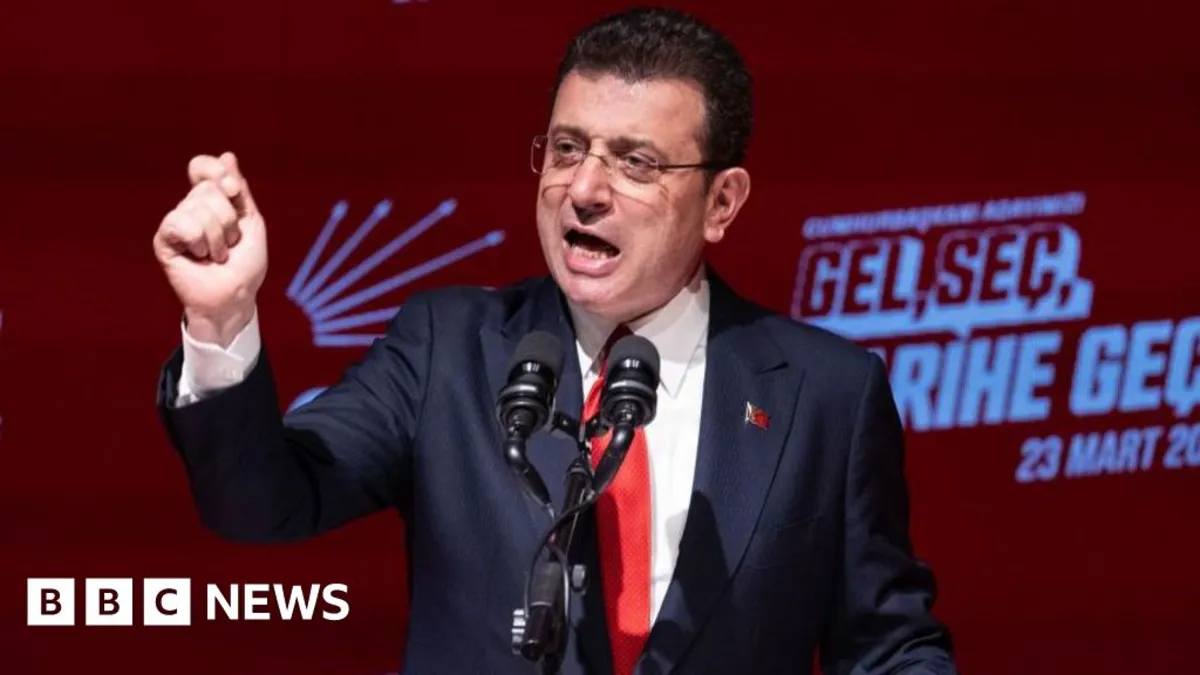
In a dramatic escalation of political tensions, Turkish authorities have detained Istanbul's mayor, Ekrem Imamoglu, just days before he was set to be named a presidential candidate. Imamoglu, a member of the secular Republican People's Party (CHP), is recognized as one of the strongest political adversaries of President Recep Tayyip Erdogan. The prosecutor's office has leveled serious accusations against him, including corruption and aiding a terrorist group, branding him as a suspect in a criminal organization.
As part of this extensive investigation, authorities have detained approximately 100 individuals, including other politicians, journalists, and businessmen. In response to the unrest, the Istanbul governor's office has imposed a four-day restriction on public gatherings throughout the city. In a powerful message shared online, Imamoglu stated, "The will of the people cannot be silenced," emphasizing his commitment to democracy and justice.
In a video posted on social media, he reiterated his resolve to stand firm for the rights and freedoms of the people of Turkey and those who cherish democracy globally. Imamoglu's arrest is part of a broader crackdown on opposition figures, which has raised concerns among critics who view these actions as politically motivated.
Despite widespread criticism, President Erdogan and his party maintain that Turkey's judiciary operates independently from political influence. Erdogan has held power for over two decades, and the recent events signal a significant challenge to his authority. Imamoglu's successful reelection as mayor last year marked a pivotal moment in Turkish politics, as his CHP party emerged victorious in local elections across major cities, including Ankara—a notable defeat for Erdogan's party.
The early-morning raid on Imamoglu's residence involved numerous police officers, highlighting the seriousness of the government's stance. This arrest comes just ahead of the CHP's presidential candidate selection on Sunday, where Imamoglu is the sole candidate. Compounding the situation, Istanbul University recently annulled Imamoglu's degree due to alleged irregularities—an action that, if upheld, could disqualify him from running for president, as the Turkish constitution mandates candidates possess higher education.
Imamoglu has labeled the university's decision as legally baseless, advocating for the independence of educational institutions from political interference. The CHP has described the recent actions against Imamoglu as a coup attempt, arguing that these measures are designed to undermine the electoral process and manipulate the will of the people. CHP chairman Ozgur Ozel expressed on social media that such actions represent a grave violation of democratic principles.
Deputy chairman Ilhan Uzgel echoed these sentiments, condemning the government's use of detention to intimidate opposition voices. He voiced concerns regarding the overall state of democracy in Turkey, particularly in light of the government’s efforts to suppress dissent.
Pro-government media outlets have reported that Imamoglu faces additional accusations, including extortion, fraud, and aiding the PKK (Kurdistan Workers' Party), which has been designated as a terrorist organization by Turkey, the EU, UK, and the US. Following the mass detentions on Wednesday, Istanbul's governor enacted a four-day ban on all public demonstrations, meetings, and press releases to maintain public order and prevent potential provocations.
In addition to the crackdown on public gatherings, many streets in Istanbul have been closed to traffic, and several metro lines have suspended operations. Furthermore, reports from UK-based internet watchdog Netblocks indicate that Turkey has implemented severe restrictions on access to social media platforms such as X, YouTube, Instagram, and TikTok following the arrests.
This is not the first instance where Imamoglu has encountered legal troubles. In 2022, he received a sentence of over two-and-a-half years in prison for allegedly insulting public officials during a speech. As Turkey navigates these tumultuous political waters, the future of democracy and free expression remains a pressing concern.